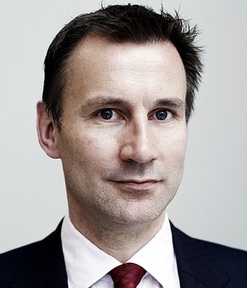Government sets cap for social care bills at £75,000, but pensioners call plan 'as credible as Findus Lasagne'
The Government has revealed it is to set the cap for social care bills at £75,000, claiming it will end the “scandal” of people being forced to sell their homes to fund care.

Health Secretary Jeremy Hunt is to make a Commons statement on funding adult social care this afternoon.
Under the plans, those who spend £75,000 on their care whether in their home or in a residential care home would have any further costs paid for by the state. Board and lodging are not covered by the cap and will continue to be means tested.
At the moment, people get no help with paying for residential care if they have more than £23,250. Under the proposals the threshold will rise to £123,000.
The plans, which are part of the Care and Support Bill, will come into force in 2017.
The Government’s proposals are in response to recommendations by economist Andrew Dilnot in the Dilnot report which came out in 2011. These suggested there should be a cap of £35,000 on the amount an individual would have to pay for care.
Government officials claim the £75,000 cap has been set at 2017 prices which would be just over £60,000 at 2010/11 prices. The new £123,000 asset threshold is also a figure with inflation on the £100,000 ceiling in the Dilnot report.
The Government claims it will fund the proposals by freezing inheritance tax.
Mr Hunt revealed the plans on the BBC’s Andrew Marr Show yesterday. He told the BBC “we have a scandal in this country, that every year 30-40,000 people are having to sell their homes to pay for their care costs. As Conservatives we want to help people who have done the right thing, who have saved.
He added: “By setting an upper limit to how much people have to pay then it makes it possible for insurance companies to offer policies or for people to have options on their pension so that anything you pay under the cap is covered. We need to change the culture in this country so that, just as people make provision for their pensions in their 20s, their 30s, so we also need to be a country where people need to make provision for their social care.”
Mr Dilnot has said the cap is higher than he would have wished but added it is not “so different” from what the Dilnot Commission suggested. He said he is glad the proposals will give some “certainty” as at the moment, people don’t know how much they will have to pay for social care when they get older.
However the proposals have not gone down well with the pensioners themselves.
Dot Gibson, general secretary of the National Pensioners Convention, called the plan to reform social care funding “about as credible as a Findus Lasagne” because it lacks sufficient funding to tackle the problems that pensioners face. Ms Gibson claimed the proposals “simply tinker at the edges” and said: “The current system is dogged by means-testing, a postcode lottery of charges, a rationing of services and poor standards and nothing in the plan looks like it will address any of these concerns. Setting a lifetime cap on care costs of £75,000 will help just 10 per cent of those needing care, whilst the majority will be left to struggle on with a third rate service.
“Using inheritance tax or money saved from the state pension system simply won’t raise enough money to bring about the change that’s needed. It’s time we merged health and social care and had a truly integrated system which was funded through general taxation – like the NHS – rather than put all the responsibility on pensioners and their families.”
But the plans have been welcomed by Baroness Sally Greengross, chief executive of the International Longevity Centre – UK (ILC-UK) who called the measures “an important first step in the right direction”.

She said: “The ageing of the UK population means that both the number of people needing care, and the cost of providing it, are increasing. Spending on long term care is projected to rise between 2016/17 and 2061/62 by £14bn in today’s money.”
She added: “It has taken many years of policy interest in this area to make this progress. The next steps are critical.”
Andrew Chidgey, director of External Affairs of The Alzheimer’s Society also called it an “important step forward” but added “the devil will be in the detail”.
He said: “Raising the means test threshold could take thousands out of the firing line for huge costs. Capping care costs for the first time is a step in the right direction, but a £75,000 cap is so high that it would only help the few.
“The 800,000 people with dementia in the UK are amongst the hardest hit by a system that charges massive amounts for essential care. As well as taking action on this Dementia Tax it is vital that Government also looks at the huge underfunding of the system. We need them to plug the gap in social care funding in order to secure the care system for the future.”
Latest News
 29-Jul-24
Dementia Bus gives carehome.co.uk staff insight into life with dementia
29-Jul-24
Dementia Bus gives carehome.co.uk staff insight into life with dementia
 01-Mar-24
Find out the top care homes in 2024
01-Mar-24
Find out the top care homes in 2024
 21-Mar-23
UK's top care homes in 2023 revealed
21-Mar-23
UK's top care homes in 2023 revealed
 03-Jan-23
carehome.co.uk launches free care helpline
03-Jan-23
carehome.co.uk launches free care helpline
 13-Dec-22
5 mins with Emily Whitehurst, chief operating officer for Constantia Healthcare
13-Dec-22
5 mins with Emily Whitehurst, chief operating officer for Constantia Healthcare